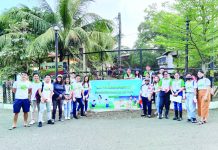
ILOILO City – The University of San Agustin (USA) conducted a virtual press conference in celebration of its 68th anniversary as a University. The 2021 USA Research Press Conference kicked off around 10:00 am on March 2 followed by a message from Fr. Frederick Commendador, OSA, University President, wherein he extended his gratitude to the Department of Science and Technology for the continued support to the university in the form of grants.
Dr. Doraly Dalisay, director of the Center for Chemical Biology and Biotechnology (C2B2) of USA, presented her study entitled, “The Development of Kadios as Skin Antibiotic”. One of Dr. Dalisay’s aims regarding the study is to develop a topical formulation against skin infections caused by Staphylococcus aureus using kadios extract. Furthermore, she wanted to promote research as a tool for creating novel solutions and emerging health problems through technology development and innovation in fields of rapid advancement.
The next presenter was Dr. Christopher Marlowe Caipang, faculty of the Biology program of the university, who talked about “Biofloc Technology for Better Quality Shrimps.” In his study’s rationale, Caipang wanted to address biosecurity issues. Seeing that shrimp production in the country was hampered by infectious diseases and its decrease in production due to the pandemic, pushed Caipang to conduct the study.
His project tagged as the ‘New Normal’ for the Shrimp Culture Industry aims to have positive outcomes like good quality and sufficient quantity of shrimps in the country. He also wanted to promote biofloc-based nursery production of shrimp in tanks.
The final presentation was made by the associate vice president for Research of the University and director of the Center for Natural Drug Discovery and Development (CND3) – Dr. Jonel P. Saludes’ PHILMARINE BLI for the discovery of Beta-Lactamase Inhibitor. Dr. Saludes’ goal is to produce a new bio-lactamase inhibitor. The study aims to lay a foundation for new combination therapies that restore the efficacy of cost-effective beta-lactam antibiotics; reduce dependence on expensive third and fourth generation BLAs; better understanding of BLI’s mechanism-of-inhibition; acceleration of basic research and development for new antibiotics to combat the global problem of antibiotic resistance; development of a locally available testing panel of molecularly characterized clinical isolates from Filipinos; genetic profiles of resistance that can guide clinicians in prescribing suitable antibiotics for patients; and elevate science and technology research human resource of the country and the Western Visayas to global competitiveness./PN



